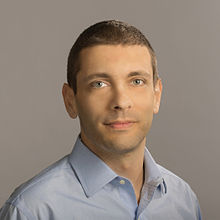Gecko is a browser engine developed by Mozilla. It is used in the Firefox browser, the Thunderbird email client, and many other projects.

ChatZilla is an IRC client that is part of SeaMonkey. It was previously an extension for Mozilla-based browsers such as Firefox, introduced in 2000. It is cross-platform open source software which has been noted for its consistent appearance across platforms, CSS appearance customization and scripting.
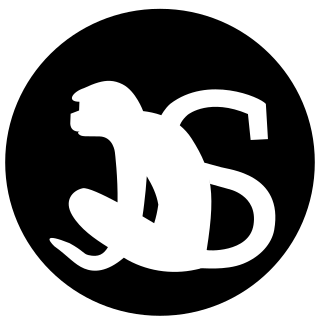
SpiderMonkey is open-source JavaScript and WebAssembly engine by the Mozilla Foundation.

Gong Li, also known in English as Li Gong, is a Chinese computer scientist who is CEO of Linaro Ltd, a British company headquartered in Cambridge, U.K., developing systems software for the Arm ecosystem. He was previously the Founder and CEO of Acadine Technologies, a systems software company specializing in mobile operating systems for mobile, wearable, and IoT devices. Acadine’s core product H5OS was a web-centric operating system that was primarily based on the open web standard HTML5. It was derived from Firefox OS, whose development Li had overseen as President of Mozilla Corporation.
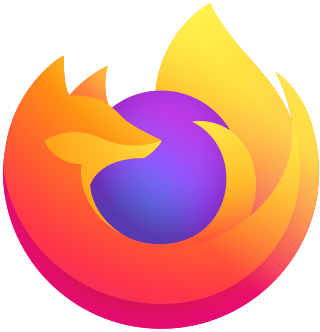
Mozilla Firefox, or simply Firefox, is a free and open-source web browser developed by the Mozilla Foundation and its subsidiary, the Mozilla Corporation. It uses the Gecko rendering engine to display web pages, which implements current and anticipated web standards. In November 2017, Firefox began incorporating new technology under the code name "Quantum" to promote parallelism and a more intuitive user interface. Firefox is available for Windows 7 and later versions, macOS, and Linux. Its unofficial ports are available for various Unix and Unix-like operating systems, including FreeBSD, OpenBSD, NetBSD, illumos, and Solaris Unix. It is also available for Android and iOS. However, as with all other iOS web browsers, the iOS version uses the WebKit layout engine instead of Gecko due to platform requirements. An optimized version is also available on the Amazon Fire TV as one of the two main browsers available with Amazon's Silk Browser.

Brendan Eich is an American computer programmer and technology executive. He created the JavaScript programming language and co-founded the Mozilla project, the Mozilla Foundation, and the Mozilla Corporation. He served as the Mozilla Corporation's chief technical officer before he was appointed chief executive officer, but resigned shortly after his appointment due to controversy over his opposition to same-sex marriage. He subsequently became the CEO of Brave Software.
Netscape Plugin Application Programming Interface (NPAPI) was an application programming interface (API) of the web browsers that allows plugins to be integrated.
A JavaScript engine is a software component that executes JavaScript code. The first JavaScript engines were mere interpreters, but all relevant modern engines use just-in-time compilation for improved performance.

The Mozilla Corporation is a wholly owned subsidiary of the Mozilla Foundation that coordinates and integrates the development of Internet-related applications such as the Firefox web browser, by a global community of open-source developers, some of whom are employed by the corporation itself. The corporation also distributes and promotes these products. Unlike the non-profit Mozilla Foundation, and the Mozilla open source project, founded by the now defunct Netscape Communications Corporation, the Mozilla Corporation is a taxable entity. The Mozilla Corporation reinvests all of its profits back into the Mozilla projects. The Mozilla Corporation's stated aim is to work towards the Mozilla Foundation's public benefit to "promote choice and innovation on the Internet."
Tamarin is a discontinued free software virtual machine with just-in-time compilation (JIT) support intended to implement the 4th edition of the ECMAScript (ES4) language standard. Tamarin source code originates from ActionScript Virtual Machine 2 (AVM2) developed by Adobe Systems, as introduced within Adobe Flash Player 9, which implements ActionScript 3 scripting language. ActionScript Virtual Machine 2 was donated as open-source to Mozilla Foundation on November 7, 2006, to develop Tamarin as a high-performance virtual machine, with the support from broad Mozilla community, to be used by Mozilla and Adobe Systems in the next generation of their JavaScript and ActionScript engines with the ultimate aim to unify the scripting languages across web browsers and Adobe Flash platform and ease the development of better performing rich web applications.

Mozilla Firefox 4 is a version of the Firefox web browser, released on March 22, 2011. The first beta was made available on July 6, 2010; Release Candidate 2 was released on March 18, 2011. It was codenamed Tumucumaque, and was Firefox's last large release cycle. The Mozilla team planned smaller and quicker releases following other browser vendors. The primary goals for this version included improvements in performance, standards support, and user interface.
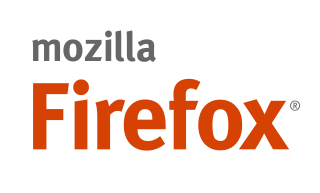
Mozilla Firefox 3.5 is a version of the Firefox web browser released in June 2009, adding a variety of new features to Firefox. Version 3.5 was touted as being twice as fast as 3.0. It includes private browsing, has tear-off tabs, and uses the Gecko 1.9.1 engine. It was codenamed Shiretoko during development, and was initially numbered Firefox 3.1 before Mozilla developers decided to change the version to 3.5, to reflect the inclusion of a significantly greater scope of changes than were originally planned. It is the last major version to support X BitMap images.
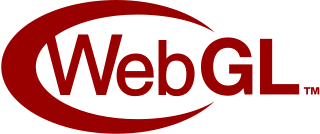
WebGL is a JavaScript API for rendering interactive 2D and 3D graphics within any compatible web browser without the use of plug-ins. WebGL is fully integrated with other web standards, allowing GPU-accelerated usage of physics and image processing and effects as part of the web page canvas. WebGL elements can be mixed with other HTML elements and composited with other parts of the page or page background.

Firefox OS is a discontinued open-source operating system – made for smartphones, tablet computers, smart TVs, and dongles designed by Mozilla and external contributors. It is based on the rendering engine of the Firefox web browser, Gecko, and on the Linux kernel. It was first commercially released in 2014.
Firefox was created by Dave Hyatt and Blake Ross as an experimental branch of the Mozilla browser, first released as Firefox 1.0 on November 9, 2004. Starting with version 5.0, a rapid release cycle was put into effect, resulting in a new major version release every six weeks. This was gradually accelerated further in late 2019, so that new major releases occur on four-week cycles starting in 2020.

Mozilla is a free software community founded in 1998 by members of Netscape. The Mozilla community uses, develops, spreads and supports Mozilla products, thereby promoting exclusively free software and open standards, with only minor exceptions. The community is supported institutionally by the non-profit Mozilla Foundation and its tax-paying subsidiary, the Mozilla Corporation.

PDF.js is a JavaScript library that renders Portable Document Format (PDF) files using the web standards-compliant HTML5 Canvas. The project is led by the Mozilla Corporation after Andreas Gal launched it in 2011.
Acadine Technologies Holdings Limited was a systems software company specializing in mobile operating systems for mobile, wearable, and Internet of Things (IoT) devices. Its core product is H5OS, a web-centric operating system that is primarily based on the open web standard HTML5. It is derived from Firefox OS, whose development company founder Li Gong had overseen as president of Mozilla Corporation.

Michael Franz is an American computer scientist best known for his pioneering work on just-in-time compilation and optimisation and on artificial software diversity. He is a Chancellor's Professor of Computer Science in the Donald Bren School of Information and Computer Sciences at the University of California, Irvine (UCI), a Professor of Electrical Engineering and Computer Science in the Henry Samueli School of Engineering at UCI, and Director of UCI's Secure Systems and Software Laboratory.
